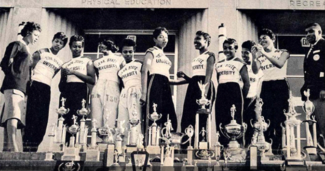Mr. Temple and The Tigerbelles (Neff, 2018): SA
Reviewed by Larry Gleeson at the Nashville Film Festival.
 While many of us have heard of Wilma Rudolph, the sickly child who wore leg braces until the age of 8, who went on to become the first athlete to win three Olympic Gold medals in track and field, most of us have never heard of Edward S. Temple, the coach of the Tennessee State Tigerbelles track team. Mr. Temple and the Tigerbelles is a 40-minute documentary about the legendary track and field coach and a group of 40 African American female athletes who broke the color barrier of the Olympics during the Jim Crow era, snagging 23 medals, 16 of them Gold at the 1960 Olympics in Rome.
While many of us have heard of Wilma Rudolph, the sickly child who wore leg braces until the age of 8, who went on to become the first athlete to win three Olympic Gold medals in track and field, most of us have never heard of Edward S. Temple, the coach of the Tennessee State Tigerbelles track team. Mr. Temple and the Tigerbelles is a 40-minute documentary about the legendary track and field coach and a group of 40 African American female athletes who broke the color barrier of the Olympics during the Jim Crow era, snagging 23 medals, 16 of them Gold at the 1960 Olympics in Rome.
The film opens with the sound of a starter pistol and the beginning of a sprint and deftly transitions with a match cut to a black and white archival footage of Wilma Rudolph dominating a 100 meter dash. Voice over narration informs the viewer of the beginning of integration in the United States of America. The Civil Rights movement is emerging and the Tennessee Tigerbelles are dominating world track and field competition.
The story is a non-linear treatment as its attention grabbing opening begs the question of why. As the storyline transgresses back to 1946 and the arrival of Ed Temple on the Tennessee State University (TSU) campus, the viewer in introduced to a man trying to make ends meet for his family teaching and holding a Postal Service job. TSU President Walter Davis noticed something about Mr. Temple and offered him the women’s track coach position. With the job, Mr. Temple was given $300 and two station wagons. The rest as they say is history.
Only this history is being forgotten. Mr. Temple recruited his athletes to come to the historically black university in Nashville, Tennessee (the school merged with University of Tennessee at Nashville, a formerly white institution in 1979) without the enticement of scholarships. Yet, one hundred percent of his athletes graduated. Temple desire to succeed was instilled into his athletes with a tough love. He was at once a coach, a guidance counselor and a father figure. Numerous interviews from his former steeds attest to the fact they owed much of their career success and life success to the principles and life lessons Mr. Temple taught.
The night before an unveiling of a statue dedicated to Mr. Temple, a group of friends and former athletes felt the world needed to know about the Tennessee Tigerbelles and the driving force behind much of their unprecednted success, Edward S. Temple. After spearheading the fundraising, Bo Robertson undertook the Ed Temple Documentary Fund and after bringing on Tom Neff to make the film and Shelly Hay to produce is bringing the vision of bringing the world to Mr. Temple’s historic Tigerbelles.
Barry Rubinow edits the film with some excellent match cuts. The accompany musical score augments and propels the inspirational nature of the film’s message that left several audience members in tears. Mr. Temple and the Tigerbelles is more than a documentary on the Tennessee State Tigerbelles. In its current short form it serves as an historical document of “the best of the best that America can be.” A must-see film!
About this entry
You’re currently reading “Mr. Temple and The Tigerbelles (Neff, 2018): SA,” an entry on Student Film Reviews
- Published:
- 10.06.19 / 8am
- Category:
- Films
3 Comments
Jump to comment form | comments rss [?]